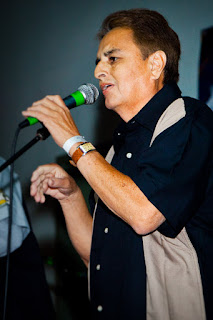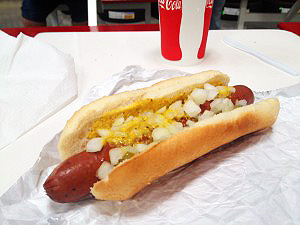I also happen to enjoy good service. It’s like great art: you know it when you see it. And when I’ve been on the receiving end of an attentive, prompt, knowledgeable, intelligent, humorous, caring, alert food server, I have no problem showing my appreciation by saying it with cash in the form of a generous tip.
What can I say. I’m a giver.
What I don’t need is a Gratuity Guideline on my check. Especially one that starts at 18%. If the service has been lousy, 18% is going to be an impossible dream for the server.
For me, this has exactly the opposite of the intended effect. Instead of being grateful for them doing the math for me, I resent the fact they want me to consider the tip at a certain starting amount, regardless of the quality of the service.
From what I can tell, most of the time the wait-staff is a little embarrassed by it as well.
If they’re going to give me guidelines on how much I should leave for a tip, I’d like to offer restaurants the following guidelines on how to run their business.
First, hire people who want to be there. Really nothing worse than a waiter or waitress who makes you feel like they’re doing you a favor by taking your order. Don't make me wait until the mood strikes you before you come over.Make sure your staff knows the menu. Enough with “I’ll check with the kitchen.” They should know the menu as well as they know their next audition time. They should also know the ingredients in every item, if substitutions are allowed, and what the specials are.
Remember the reason we’re there is because we’re hungry. The fact their job description has the word “wait” in it shouldn’t be taken literally. Whether they’re bringing the food or an expediter is, it should arrive promptly and hot if it’s a cooked item.
Clear my table as you go. I hate trying to navigate the battlefield of used plates, glasses, soiled napkins and silverware. No I don't want to "hang on to my fork." When you bring some, take some away.
Find a balance. Don’t come by every two minutes asking if everything’s alright, but don’t disappear entirely either. Strike a balance between being a good server and annoying the crap out of me by asking me questions every few minutes while I’m trying to enjoy my meal. And when you ask, it'd be better to do it when I don't have a mouthful of food.
Do laundry. Whether you wear your own clothes on the job or the restaurant provides a uniform, make sure it looks clean and crisp. It not only reflects on you but, in the same way a clean car runs better, it makes the food taste better.
Don't bring the check in the middle of the meal. And don't say, "I'm just going to leave it here. Take your time." When you bring the check before I'm anywhere near done, what you're really saying is, "Here's your hat. What's your hurry?" The other thing the check says is you're done with me. And I don't want you to be done with me until I'm done with my meal.Stop upselling me dessert. I know this comes right out of the manual and you're required to do it. But be the William Wallace (look it up) of the dessert tray and strike a blow for independent thinking. If we've had enough food to feed an army, and look like we're going to explode, don't ask about dessert. Just bring the check.
There's definitely more advice I could dish out, but that seems like a good start. Don't worry about tipping me for it.
It's on me.

















